
Facing the Freeze: Keeping Your Commercial Garage Doors in Top Shape
No matter the season, it is important to properly maintain your garage door in order to ensure long-term durability and dependable service, especially during the cold winter months. Preparing your garage doors for harsh winter conditions, conducting routine maintenance checks, adding winter lubrications, and addressing common cold weather issues are all necessary steps to ensure that your garage door continues to work properly in the colder months.
Preparing Your Garage Doors for Harsh Winter Conditions
Preparing your garage doors for harsh winter conditions is an important task that should not be taken lightly. Generally, taking the necessary precautions in fall can save major headaches in the winter, as the extreme weather can quickly take a toll on unprepared systems. However, most people often overlook the need for weatherizing their garage doors. Regular maintenance is key, and will help prevent costly repairs in the long run.
On the other hand, it is relatively simple to ready your doors for the potentially dry and cold weather of the season. Firstly, inspect all hardware, such as hinges, wheels, and rollers, and apply a high-quality lubricant. This will prevent any added strain on these components and extend their lifetime. Similarly, inspect all mechanical components, such as openers, springs, and cables, and tighten any screws that have become loose. Finally, clean the door and apply an extra layer of weather proofing to ensure that snow, ice, and harsh winds won’t be able to cause any damage.
It is important to remember that severe weather conditions can cause hard-to-spot damages. To ensure that your door is kept in optimal condition, it is important to regularly check for any signs of rust or water infiltration. Moreover, you can also consider getting an insulated door, as these will help keep your garage insulated for longer and protect the door from large temperature fluctuations.
Ultimately, regular maintenance and regular inspections of garage doors are key in ensuring a safe and secure winter for your family and your car. In addition, seeking the help of a garage door specialist may be necessary if you are unable to perform the work yourself. Consequently, preparing your garage doors for the cold season is not a task to be taken lightly, but can be relatively simple to achieve with the right knowledge and the right tools.
Routine Maintenance Checks for Cold Months
Maintaining your commercial garage doors is essential year-round, but as the cold months approach, it becomes even more critical. Cold weather can take a toll on your garage doors, leading to various issues that can disrupt your business operations. To ensure your commercial garage doors continue to function efficiently during the winter season, here are some routine maintenance checks you should perform:
- Inspect Weather Stripping: Begin by checking the weather stripping around your garage doors. Cold air and moisture can easily seep in through damaged or deteriorated weather stripping, causing drafts and potential damage to your equipment or stored items. Replace any worn-out or damaged weather stripping to maintain a tight seal.
- Lubricate Moving Parts: The cold weather can cause lubricants to thicken or solidify, leading to increased friction in moving parts. Regularly lubricate hinges, rollers, springs, and tracks with a lubricant suitable for low temperatures. This helps ensure smooth and efficient door operation.
- Examine Springs and Cables: Cold temperatures can make garage door springs and cables more brittle and susceptible to breaking. Inspect these components for signs of wear, rust, or damage. If you notice any issues, it’s crucial to have them replaced promptly to prevent unexpected door failures.
- Check for Proper Balance: A garage door that is not properly balanced can strain the opener and lead to premature wear and tear. Test the balance of your commercial garage door by disconnecting the opener and manually opening and closing the door. It should move smoothly and stay in position when partially opened. If it doesn’t, consult a professional for adjustment.
- Clean Tracks and Rollers: Dust, debris, and ice buildup can hinder the smooth movement of garage door rollers and tracks. Regularly clean these areas and ensure they are free of obstructions. Lubricate the rollers after cleaning to prevent freezing.
- Inspect Electrical Components: Cold weather can affect the performance of electrical components, such as sensors and safety features. Test these components to ensure they are functioning correctly. Make sure the safety reverse feature responds appropriately to obstacles, and check the alignment of the photoelectric sensors.
- Review Opener Settings: Adjust the settings on your garage door opener to accommodate colder temperatures. Cold weather can affect the sensitivity of the opener’s safety features, so make sure they are set correctly. If needed, consult the manufacturer’s guidelines for cold-weather adjustments.
- Battery Maintenance: If your garage door opener uses a backup battery system, ensure the battery is in good condition. Cold temperatures can reduce battery efficiency, so consider replacing it if it’s older or not holding a charge effectively.
- Schedule Professional Inspection: Finally, it’s advisable to have a professional garage door technician conduct a thorough inspection and maintenance service before the winter season. They can identify any potential issues and perform necessary repairs or adjustments to keep your doors operating smoothly throughout the cold months.
By regularly performing these maintenance checks and addressing any issues promptly, you can minimize the risk of unexpected garage door failures and ensure the safety and efficiency of your commercial garage doors during the cold months.
Essential Winter Lubrication: Keeping Doors Moving Smoothly
Essential winter lubrication is one of the most important steps in ensuring the smooth functioning of doors during the cold months. During winter, temperatures can drop to well below freezing which can cause grease and lubricants inside the door to harden and become less effective. Moreover, the snow and cold wind can force extra dirt and debris into the door’s hinges. In addition, when the weather changes rapidly and temperatures swing widely, the extra pressure can lead to additional wear on the door’s components. Therefore, in order to keep doors moving smoothly during winter and beyond, it is important to use a lubricant specifically designed for low temperatures.
One option is to use a low-temperature lubricant like WD-40 Extreme Temperature or 3M Extreme Cold Lubricant. These lubricants have been designed to stay liquid in subzero temperatures and will help keep your door hinges moving smoothly, even in the coldest conditions. Furthermore, it is important to clean the door’s components before lubricating them – dirt and debris can impede lubrication and cause even greater friction. To avoid this, use a damp cloth to gently wipe away debris, then apply a light coat of the low-temperature lubricant to each of the hinges, bolts, and screws. For instance, if you have a sliding door, you can also apply the lubricant along the track and around the door’s perimeter to ensure longer lasting performance.
Finally, it is important to check all of the components of your door regularly throughout the winter season to ensure they remain properly lubricated and free of dirt and debris. Similarly, you should continue to use a low-temperature lubricant before winter begins in order to maximize the longevity of the door’s components. Properly lubricating your doors during the cold winter months will help minimize damage and keep your doors moving smoothly all year long. Consequently, those who take these winter lubrication precautions can enjoy more efficient and longer lasting doors.
Addressing Common Cold Weather Garage Door Issues
Common cold weather garage door issues can cause no end of frustration, but there are luckily ways to resolve most problems. The first thing to do is to check for air leaks. If there is a draft, the door might not be able to rise or close properly. Weather stripping is an easy and cost-effective solution to air leak issues. However, some doors struggle with heavy snow and ice accumulations in winter. To address this, it’s best to regularly brush the snow off your garage door, and use a heat gun or blow dryer to melt the ice off. In addition, the tracks and rollers of the garage door itself should be kept clear of dirt and debris. Even if a homeowner fails to take preventive measures, it’s highly likely that the door opener will stop working due to the cold. In this case, unplugging the opener and frequently lubricating the metal components with WD-40 can be a good fix.
Finally, it might be worth making use of a garage door insulation kit. While it’s more expensive than weather stripping, it’s worth it as it helps prevent excess draft and excessive snow and ice buildup in the long run. Furthermore, insulation helps to keep the warm air generated by the garage door opener from escaping, thus making the door and opener more efficient. Consequently, if homeowners wish to avoid encountering the common problems associated with cold weather garage doors, it’s advisable to make use of both preventive measures and insulation.
Key Takeaaways
Preparing your garage doors for winter weather is necessary to keep them functioning smoothly. It should begin with a series of routine maintenance checks and lubrication that is best practiced twice a year, and special attention should be paid to the cold months. However, more could be done to tackle the problem, such as cleaning the tracks and replacing worn parts when needed, as well as regularly checking the remaining hardware for loose screws or bolts and making sure the springs are still in good working condition. Proper insulation and sealing are also important. Addressing common cold weather issues, such as the expansion of metal components due to colder temperatures, could be a good start towards reaching winter readiness. Ultimately, with the right preparation and due diligence, you can make sure that your garage doors stay fully functional, safe, and secure this winter season.
Frequently Asked Questions
Why is winter maintenance crucial for commercial garage doors?
Winter maintenance is crucial for commercial garage doors to ensure the safety of both people and property. Cold weather can cause the hardware of the door, such as the hinges, rollers, springs, and other components, to become brittle and wear out faster than in warmer temperatures. This makes it important to have the doors regularly inspected and maintained by professionals to ensure they are operating as efficiently and safely as possible. Additionally, cold weather can cause the seals on the doors to lose their effectiveness, increasing the risk of drafts and heating costs increasing. Regular maintenance, such as lubrication and adjustments, can help preserve the door’s performance and lengthen its service life.
How often should I inspect my commercial garage doors during cold months?
In general, it is best to inspect your commercial garage doors during cold months at least twice a year, or more frequently if possible. During your inspection, you should look for signs of aging, rust, corrosion, broken or worn hardware, or potential security risks. Check that the hinges, tracks, brackets, rollers, springs, and hardware are in proper working order. Pay special attention to any areas of possible weakness or wear, and replace any damaged parts. Also make sure to lubricate all moving components to prevent any friction from causing further wear and tear.
What lubrication is recommended for winter conditions?
The best lubrication for winter conditions is a wax-based lubricant, as it does not freeze in cold weather. Wax lubes also help protect against rust and corrosion and can offer lasting protection even in wet, muddy conditions.
Can extreme cold damage my garage doors?
Yes, extreme cold temperatures can damage the seals and insulation of your garage doors, making them less efficient and potentially causing them to break. A cold winter can also cause metal garage doors to become brittle and more susceptible to warping or breaking due to impacts or accidental bumps. To prevent these issues, it is important to keep your garage doors well lubricated and insulated, and to make sure they are properly maintained.
Table of Contents
More Blogs to Check Out!
Categories

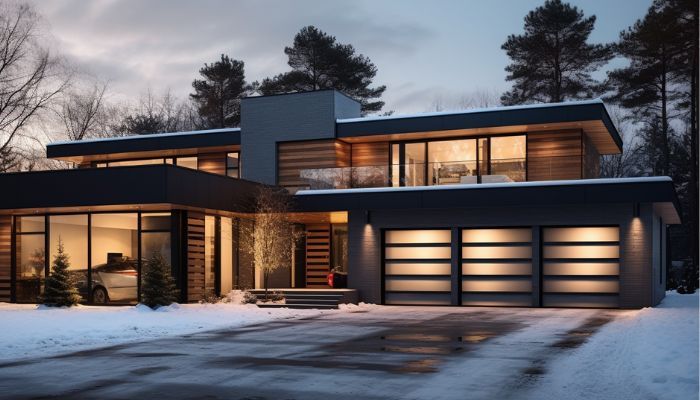
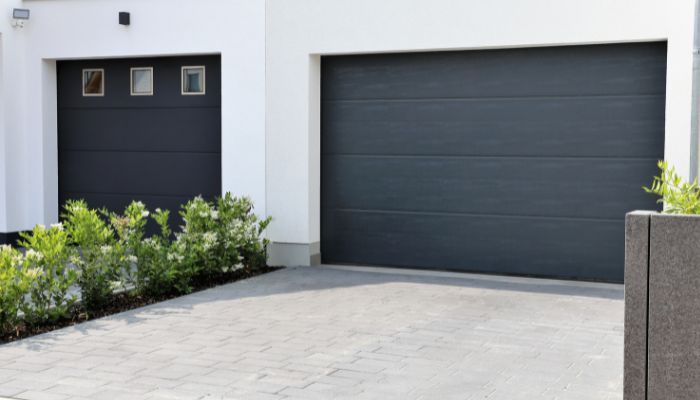


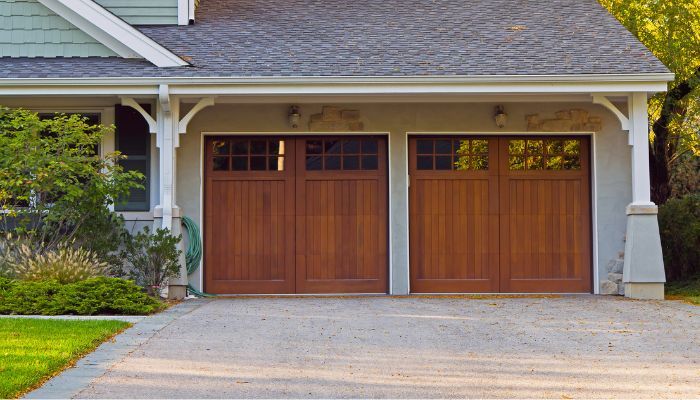
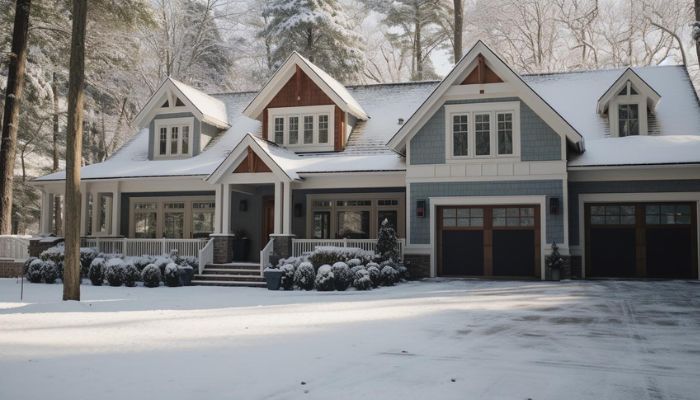
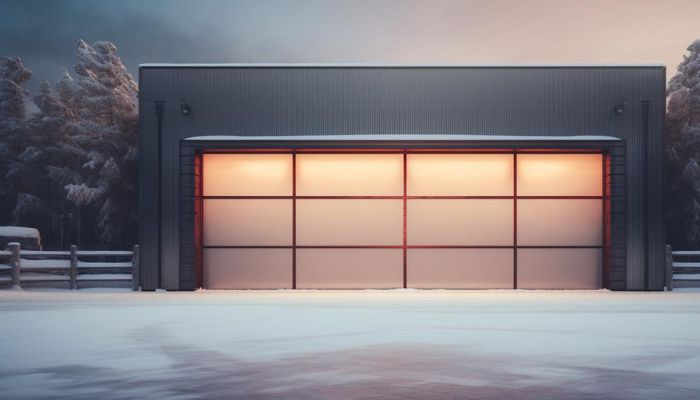
Leave a Reply